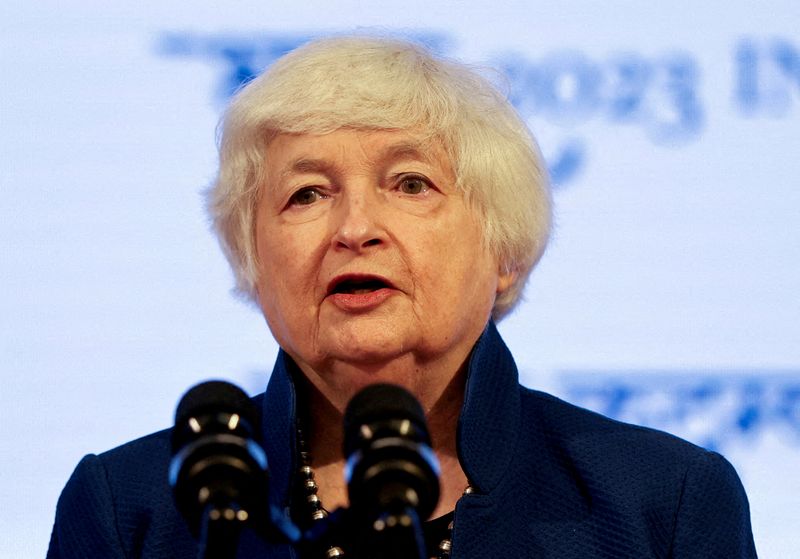By David Lawder
WASHINGTON (Reuters) -U.S. Treasury Secretary Janet Yellen on Thursday said U.S. third quarter economic growth of nearly 5% was a good sign that the economy was headed for a soft landing, but could help keep longer-dated bond yields elevated.
"It's a good strong number and shows the economy is doing well," Yellen said at a Bloomberg live interview event. "What we have looks like a soft landing."
The Commerce Department said U.S. GDP grew at the fastest pace in nearly two years, defying warnings of a recession as higher wages in a tight labor market fueled consumer spending and business inventory restocking.
Yellen said the recent sharp rise in long-term bond yields is reflective of confidence in the U.S. economy and expectations that interest rates will be higher for longer as a result.
Yellen, in a televised interview with Bloomberg, said it was also possible that yields on longer-dated bonds will come down in coming years, as structural conditions for a long-term decline in real interest rates related to U.S. demographics still exist.
"It's perfectly possible that we will see longer-term yields come down, but nobody really knows for sure," Yellen said. "I see the higher yields as certainly an important reflection of the stronger economy."
She dismissed suggestions that higher bond yields may be due to worries about rising U.S. deficits or worries about a recession.
The Treasury on Friday reported a $1.7 trillion federal budget deficit for fiscal 2023, the largest outside the COVID-19 pandemic years, as revenue fell and outlays for Social Security, Medicare and interest costs rose sharply.
Yellen said the U.S. debt servicing burden would be a "bigger challenge if the interest rate path stays higher."
She has maintained that the real interest rate costs for the federal government have remained close to 1% of GDP, a manageable level.
Yellen added that President Joe Biden's proposed fiscal sustainability measure, including tax hikes on the wealthy that would cut deficits by $2.5 trillion over a decade, would keep debt costs manageable, at "well below 2%" of GDP.
"The higher the interest rate path, the more that we need to do" on deficit reduction, she said.
Regarding the conflict between Israel and Hamas in Gaza, Yellen said she was monitoring the economic situation closely, but at the moment was more focused on the human tragedy of civilian lives lost on both sides.

She said she did not see much in the way of consequences to the global economy from the conflict so far with oil prices flat. There could be more extensive consequences if the war expands, she said, but it was premature to speculate about those, and it was important to keep the conflict "contained."
On U.S. sanctions against Hamas, she said: "We are certainly looking at further opportunities... to try to reduce this flow of financing to Hamas."